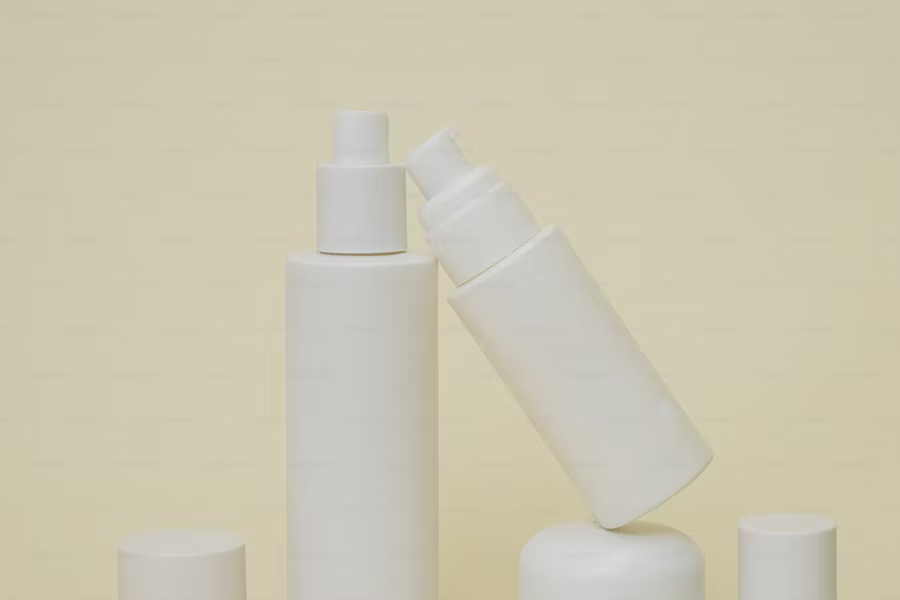Hello lovelies!
Do you have sensitive skin?
Then, you should know that sensitive skin is a common dermatological condition affecting millions of people worldwide.
Indeed, according to the National Institute of Health, 60-70% of women and 50-60% of men have some degree of sensitive skin. However, the degree of sensitivity varies depending of the populations and geographical sites.
Sensitive skin results from a heightened response to environmental and topical stimuli. Thus, sensitive skin can lead to discomfort, redness, itching, and a range of other symptoms.
All the symptoms can have a deep impact on your quality of life as well, especially on your psychological well-being. This includes a negative impact on your mood, your sleep, your productivity, and your overall performance.
Consequently, it’s very important to recognize the signs of sensitive skin early, so that you can manage it properly and effectively.
Understanding sensitive skin involves recognizing its triggers and the psychological mechanisms behind it. However, it implies employing effective management strategies for this skin condition.
In this article, I will go deep into the nuances of sensitive skin. Moreover, I will provide comprehensive guidance on how to manage your sensitive skin effectively.
Understanding Sensitive Skin: The Science Behind Your Skin Type

What is sensitive skin?
Sensitive skin is not a medical diagnosis per se. Rather, it is a subjective condition often described as an exaggerated reaction to factors that typically do not cause irritation in others.
It can occur on any part of the body. For instance, I do have some rashes in my feet and elbows during summertime. But the face is the most common target of sensitivity of your skin.
Symptoms of sensitive skin may include:
- Redness
- Burning or stinging sensations
- Dryness and flakiness
- Itching
- Tightness
These symptoms can arise due to a variety of triggers. Thus, it is essential to understand the underlying causes and mechanisms of this skin condition.
Causes and Triggers of Sensitive Skin
Sensitive skin can be influenced by a myriad of factors. They range from environmental conditions to lifestyle choices and inherent physiological traits.
Genetics
Some people are genetically predisposed to sensitive skin. This can be due to a thinner stratum corneum (the outermost layer of skin). Moreover, an inherent imbalance in the skin’s pH levels can cause sensitive skin in some people.
Environmental Factors
Some environmental factors can exacerbate skin sensitivity. Among them, you have pollution, extreme temperatures, and UV radiation. Moreover, seasonal changes can also lead to increased skin dryness and sensitivity. This is particularly true during winter,
Skincare Products
Ingredients in skincare products can trigger reactions in sensitive skin. For example, such ingredients include fragrances, alcohol, and certain preservatives. Moreover, an excessive use of exfoliants and other harsh treatments can also compromise the skin barrier. Thus, all these elements lead to heightened skin sensitivity.
Lifestyle Factors
Diet, stress, and lack of sleep can impact your skin health. For instance, foods high in sugar and dairy can trigger inflammation. Also, chronic stress can weaken the skin’s barrier function.
Medical Conditions
Sensitive skin often equals to eczema, rosacea, and psoriasis. These conditions inherently involve a compromised skin barrier and heightened immune responses.
The Physiological Mechanisms Behind Sensitive Skin
To effectively manage sensitive skin, it’s crucial to understand its physiological underpinnings. Indeed, the primary mechanism involves a compromised skin barrier function.
The stratum corneum acts as a protective shield. As a result, it prevents irritants from penetrating and retaining moisture. However, when this barrier is weakened, irritants can easily penetrate. As a consequence, this leads to inflammation and discomfort.
In addition, sensitive skin often involves an overactive immune response. Langerhans cells, a type of immune cell in the skin, can become hyperactive. And this triggers inflammation, even with minimal provocation. This inflammatory response causes the visible symptoms of redness, swelling, and itching.
How To Identify Sensitive Skin
Recognizing sensitive skin involves both self-assessment and professional diagnosis. Indeed, you can assess your skin sensitivity. You may do so by noting your own reactions to common irritants and environmental factors. I advise you keep a skin diary to identify patterns and triggers easily.
Moreover, your dermatologist can conduct patch tests to identify specific allergens and irritants. He/she may also evaluate the skin’s barrier function and hydration levels. In some cases, they may diagnose underlying skin conditions (eczema or rosacea) and treat them separately.
Understanding Sensitive Skin: Daily Care Strategies for Your Skin Type

Managing your sensitive skin requires a holistic approach. For instance, this includes proper skincare, lifestyle adjustments, and medical intervention when necessary. Here are key strategies for managing sensitive skin.
Opt for a gentle skincare routine
- Cleansing: Use a mild, fragrance-free cleanser. Avoid using hot water as it can strip the skin of its natural oils. Opt for lukewarm water instead.
- Moisturizing: Hydration is crucial. Choose a hypoallergenic, non-comedogenic moisturizer that strengthens the skin barrier. Ingredients like ceramides, hyaluronic acid, and glycerin are beneficial for sensitive skin.
- Sun Protection: Use a broad-spectrum sunscreen with SPF 30 or higher. Physical sunscreens with zinc oxide or titanium dioxide are less likely to cause irritation compared to chemical sunscreens. A good example of physical sunscreen for sensitive skin is the CeraVe 100% Mineral Sunscreen SPF 30.
- Avoid Irritants: Stay away from products containing alcohol, fragrances, and harsh exfoliants. Look for products labeled as “dermatologist-tested” or “for sensitive skin.”
What brands do I recommend? As I live in France, I especially like pharmaceutical brands such as La Roche-Posay, Eucerin, or Avene. Don’t forget that you may refer to my skincare guide for beginners for more information.
Upgrade Your Lifestyle
- Diet: Incorporate anti-inflammatory foods such as fruits, vegetables, omega-3 fatty acids, and antioxidants. Also, avoid excessive sugar, dairy, and processed foods. Read my articles on foods for a beautiful skin and foods to avoid.
- Stress Management: Practice stress-reducing activities like yoga, meditation, and regular exercise. Indeed, chronic stress can exacerbate your skin sensitivity.
- Sleep: Ensure adequate sleep to allow your skin to repair and regenerate. I recommend 7 to 9 hours of sleep daily.
Control Your Environment
- Humidity: Use a humidifier in dry environments to maintain your skin hydration.
- Clothing: Wear soft, breathable fabrics like cotton or silk. Also, avoid rough materials (cashmere, merino…) that can irritate the skin.
Other Preventive Measures
From my own experience, prevention is a key component of managing sensitive skin. By taking proactive steps, you can minimize the occurrence of sensitivity while maintaining healthier skin.
Like the famous saying states, prevention is better than cure. Here are some preventive strategies you can adopt for your sensitive skin.
- Patch Testing: Do you consider using new skincare products in your routine? Then, I suggest you conduct a patch test by applying a small amount to an inconspicuous area. Afterwards, observe for any negative reactions over 24-48 hours.
- Gradual Introduction: When starting new products, introduce them gradually to allow your skin to acclimate. In particular, this is important for products including active ingredients like retinoids or acids (AHA/BHA).
- Consistent Routine: Stick to a consistent skincare routine. Indeed, frequent changes in products can confuse and irritate sensitive skin.
- Hydration: Drink plenty of water to keep the skin hydrated from within. Indeed, proper hydration supports overall skin health and barrier function. I recommend between 1.5 to 2 liters of water per day to maintain your skin hydrated.
Understanding Sensitive Skin: Professional Treatments and When to Seek Help

Your dermatologist is very important to help you manage your sensitive skin. Indeed, thanks to his/her expertise, you may benefit from specific treatments that will relieve your symptoms quickly.
Consequently, I always advise to turn to your dermatologist when your usual over-the-counter product is not enough for you. Or you can also turn to this professional if your skin sensitivity is very high for a proper follow-up.
However, you must always be careful and privilege a personalized treatment plan. Indeed, what suits your girlfriend is not necessarily appropriate for your own skin! Here are some solutions that you can find at your dermatologist’s office.
Topical Treatments
If you have severe skin sensitivity, your dermatologist may prescribe topical treatments. For example, he/she may prescribe corticosteroids, calcineurin inhibitors, or other anti-inflammatory medications.
Oral Medications
If you have chronic skin conditions like eczema or rosacea, oral medications may be necessary. Indeed, they will be beneficial to control inflammation and immune responses.
Professional Procedures
Your dermatologist may prescribe light therapy or laser treatments to help you manage rosacea. Always ask him/her if these procedures are appropriate for your situation before starting them.
Understanding Sensitive Skin: Empower Yourself and Live It

Did you know that extreme sensitive skin could have psychological impact in your life? Indeed, many studies have shown the link between sensitive skin and some conditions. Those include depression, anxiety, stress, sleep disorders, and even suicide ideation.
Therefore, it’s very important to follow a tailor-made therapy if you’re in this case. Also, get support from friends and family that will support and help you living with your sensitive skin.
Moreover, reading testimonials from people having similar conditions can help greatly. Here are some case studies that might inspire you.
Case study #1: Angele’s Struggle with Rosacea
Angele, a 35-year-old French woman, experienced persistent redness and flare-ups on her cheeks and nose.
She couldn’t understand why she had such a skin condition and visited her dermatologist. Indeed, her skin condition decreased her self-esteem and she didn’t ant to get out anymore.
After consulting with him, she was diagnosed with rosacea. As a result, Angele implemented the following strategies:
- Switched to a fragrance-free, gentle cleanser and moisturizer.
- Applied a zinc oxide-based sunscreen daily.
- Incorporated anti-inflammatory foods like berries and salmon into her diet.
- Practiced stress-reducing activities like yoga.
- Used prescribed topical metronidazole for flare-ups.
Within three months, Angele noticed a significant reduction in redness and flare-ups. Her skin felt more comfortable and resilient. Moreover, she could get out again with her friends without being ashamed!
Case Study #2: Jean’s Battle with Eczema
Jean, a 42-year-old man, had battled eczema since childhood. He experienced intense itching and dryness, especially during winter.
He used an over-the-counter product, but soon it wasn’t enough to relieve his itching. Thus, he visited his dermatologist. After an examination, he was diagnosed with severe eczema and sensitive skin. His management plan included:
- Using a thick, ceramide-rich moisturizer multiple times a day.
- Avoiding long, hot showers and instead using lukewarm water.
- Wearing soft, breathable fabrics like cotton
- Keeping a humidifier in his bedroom during winter.
- Taking prescribed oral antihistamines during severe flare-ups
Jean’s consistent routine helped him manage his eczema effectively. Indeed, he was able to reduce flare-ups and improve his overall skin health.
I hope these case studies will encourage you in your journey to manage your sensitive skin. Also, as you may have noticed, Angele and John had personalized management plans.
Consequently, I strongly encourage you to visit your dermatologist to get the appropriate diagnosis and management plan.
The Future of Sensitive Skin Management
Advancements in dermatological research continue to enhance our understanding and management of sensitive skin. Indeed, some emerging trends include:
Microbiome Research
Studies on the skin microbiome are revealing its crucial role in skin health. Thus, researchers ate developing probiotic and prebiotic skincare products to support a healthy skin microbiome. Thus, they hope to strengthen the skin barrier more efficiently.
Personalized Skincare
Advances in technology are enabling more personalized skincare solutions. Indeed, genetic testing and AI-driven diagnostics can provide more tailored recommendations. For instance, they will be based on your individual skin types and sensitivities.
Natural and Sustainable Products
There is a growing demand for natural and sustainable skincare products. Indeed, according to a study performed by Persistent Market Research on this topic:
- the global market for natural and organic personal care generated a revenue of US$ 21,587.1 million in 2022.
- moreover, the worldwide demand for these products is expected to accelerate at 9.7% CAGR, with a market valuation of US$ 66,141.2 million by 2033.
Therefore, you can understand more why natural ingredients are more and more popular with the public. In particular, aloe vera, chamomile, and green tea extract are gaining popularity among users. This can be explained by their soothing and anti-inflammatory properties.
Barrier Repair Therapies
Currently, research focuses on advanced formulations repairing and strengthening the skin barrier efficiently. For example, cosmetics experts work on the development of new emollients, occlusives, and humectants.
Conclusion: understanding sensitive skin is crucial to manage it effectively

Sensitive skin requires careful management and a holistic approach. Indeed, understanding its causes and triggers is the first step towards effective treatment. You can manage sensitive skin successfully and enjoy healthier, more resilient skin. All you have to do is to adopt the following strategies:
- a gentle skincare routine,
- making lifestyle adjustments,
- and seeking professional guidance when necessary.
With all these strategies, understanding sensitive skin should be as easy as 1-2-3!
Well, that’s it for today! Do you have sensitive skin? Which strategies have you implemented to manage your sensitive skin? Feel free to share your experience in the comments below!
Take care, lovelies!
Want more content from me? Join my newsletter today and receive the latest updates of my website. Also, you’ll receive a wonderful gift in your email!





I was so lucky to find this article on skincare—it was exactly what I was looking for!
The comprehensive information provided really helped me understand the triggers and effective management strategies for sensitive skin.
Some think skincare is only related to women, but I totally disagree with that. I’m a male and pay close attention to my skin, so your article is very helpful to me and worth reading.
I loved the detailed explanations of the science behind sensitive skin and the practical steps for daily care.
Your article was informative and reassuring. I particularly appreciated the advice on gentle skincare routines and lifestyle adjustments. I’m definitely sharing this on social media to help others struggling with sensitive skin!
Thanks much.
Earl
You’re welcome Earl!
This article does a fantastic job of breaking down the complexities of sensitive skin in a way that is both informative and easy to understand. It’s refreshing to see an acknowledgment of how widespread this issue is, affecting millions globally.
I appreciate the emphasis on a gentle skincare routine and lifestyle changes. It’s crucial to recognize that managing sensitive skin isn’t just about slathering on products. It’s about a holistic approach that includes diet, stress management, and even environmental control.
Overall, this article is an excellent resource for anyone struggling with sensitive skin. The practical tips and thorough explanations make it a valuable guide for both newcomers and those looking to refine their skincare routine.
Thanks for your comment!
Your website has an excellent layout with easy to find information. I especially like the article ADHD as I have several friends with this challenge, and they also have children with the same issues. The research and articles that you provide are very helpful and encouraging. Thank you for this post.
Thanks !
Some wonderful information on sensitive skin here. I find I am often sensitive only to certain products, and I see your advice on doing a patch test first. Something I neglect, I simply dive right in and try it everywhere. I am sure if you find a product you like you can ask for a sample first to see if it agrees with your skin. Most good companies will do this for you.
Hydration is the other thing that makes a difference if you have both sensitive and dry skin and from the inside and outside is crucial. I think a good serum is best as it is thin enough to be absorbed by the skin.
Do you know if there is a cure for Rosacea yet?
Yes, there’s a cure but I reserve this for a specific post…
This is a well-written, interesting article on one of the most important assets human beings have. Fascinating research. I always think of the skin as an organ and as the only thing separating the visible from the invisible. My skin is irritated by stress so I have to be careful to have periods of mindfulness and meditation every day. This keeps my condition under control. I also have to be careful about hydration, so I drink constantly during the day! After all, we are 90% water, aren’t we?
Enjoyable and informative. I’ll be back!
Thanks Linden!
I have a couple of questions, do you have any more information about skin care products available for mother’s that have just given birth? My partner Jesscia has just given birth to our baby girl Mapel and she is frustrated about her stretch marks any information would be greatly appreciated!
Hello, I note the request and I’ll treat it in another article!
Hey I really appreciate your post especially since I have quite a sensitive skin as well!
When purchasing products I sometimes have to double think whether I should get it or not since I can’t be sure whether it will react or not!
I am not sure where the sensitiveness comes from however I do believe it may be genetics. Thank you for this post, I really enjoyed reading it!
Thanks again and have a great day!
You’re welcome!
This article does an amazing job of breaking down the sensitive skin in a way that is both informative and easy to understand.
It’s a crucial to recognize that managing sensitive skin isn’t just about slathering on products. It’s about a holistic approach that includes diet, stress management, and even environmental control. I appreciate all the emphasis on a gentle skincare routine and lifestyle changes.
Overall, this article is an excellent resource for anyone struggling with sensitive skin. The practical tips and thorough explanations make it a valuable guide for both newcomers and those looking to refine their skincare routine.
Thank you for sharing
You’re welcome!